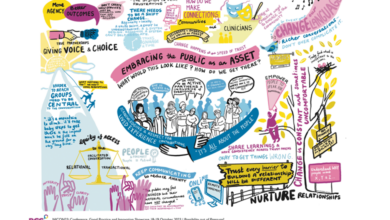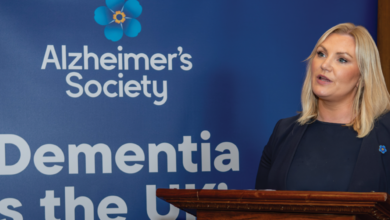The organ donation debate
 Peter Cheney assesses the Assembly’s two proposed bills on organ donation. A change in the law would have implications for the rights of most adults in Northern Ireland, their families and the state.
Peter Cheney assesses the Assembly’s two proposed bills on organ donation. A change in the law would have implications for the rights of most adults in Northern Ireland, their families and the state.
Organ transplantation saves lives but the donation of organs is highly sensitive as a significant number come from people who have recently died. Organ donation has to date been a voluntary (opt-in) process in the UK and Ireland but many European countries use an opt-out system instead.
548,291 people in Northern Ireland were on the organ donor register last year.
The total number of transplants increased from 80 to 123 between 2008 and 2011 but remained at 123 in the following year. The number of people on the transplant waiting list has varied between 210 and 230 in recent years but decreased to 176 in September 2013.
The Dobson Bill
UUP MLA Jo-Anne Dobson has regularly campaigned for more organ donation in Northern Ireland. Her son, Mark, has benefitted from a kidney donation. She wants to introduce a soft opt-out system whereby most adults would be automatically placed on the organ donation register.
When a person dies, their family would be asked whether they would consent to the organs being donated. If they did not consent, their wishes would be respected.
Dobson published her draft proposals for consultation on 4 June this year. The consultation closed on 24 September and a report summarising the responses was published on 23 October.
1,366 responses were received, of which 1,231 were through an online survey.
Eighty-two per cent of respondents supported a soft opt-out system, 15 per cent were opposed and the remainder were undecided. Dobson’s position was also taken by three political parties – Alliance, Sinn Féin and the UUP – and three medical professional groups: the British Medical Association, the Royal College of GPs and the Royal College of Physicians.
The issue is likely to be an issue of conscience for DUP MLAs as opinions vary within the party. The SDLP supports the broad themes of both the Dobson Bill and the Ross Bill (below) although the party will look at the specific provisions of each one more closely as they come forward.
An opt-out system is opposed by Care, a Christian social policy charity which claims that this would place the will of the state over the rights of families. Care maintains that it is not accurate to describe an organ – or any entity – as donated unless consent is specifically given. It says that the practical availability of intensive care beds and specialist teams is more important for increasing donations.
A spokeswoman said that the charity “passionately believes that organ donation is a positive social good” and added that Northern Ireland’s donation rate in 2011-2012 was higher than 12 European countries with opt-out systems.
 Dobson is not proposing that everyone is automatically added the register. As it stands, her Bill would exclude children and young people aged under 18 and vulnerable adults who may have a learning disability and be unable to give consent. The exemption for children was supported by 64 per cent of respondents, due to the sensitivities surrounding the death of children.
Dobson is not proposing that everyone is automatically added the register. As it stands, her Bill would exclude children and young people aged under 18 and vulnerable adults who may have a learning disability and be unable to give consent. The exemption for children was supported by 64 per cent of respondents, due to the sensitivities surrounding the death of children.
The exemption for vulnerable adults was backed by a larger majority (87 per cent) but opinion was divided on whether doctors or relatives should safeguard their rights and interests.
Dobson is also considering an exemption for people who have lived in Northern Ireland for just a short time. Approaching the family of a deceased foreign national with the question could cause more distress given the distances involved. The most common view (37 per cent) was that a person should be exempted if they have lived in Northern Ireland for less than a year. A small majority (54 per cent) also backed an exemption if the person’s identity was unknown.
Dobson explains that the decision of the family would be final rather than any decision by the state. However, if a person had said that they did not want to donate their organs – but did not formally opt out – the family could overrule the wishes of their dead relative.
The MLA says that giving the decision to the family would respect the altruistic and voluntary nature of organ donation.
Health Minister Edwin Poots indicated his support for an opt-out scheme in February this year, provided that it had a “strong educational emphasis”. That combination has explained the increased donation rates in Spain.
The Ross Bill
DUP MLA Alastair Ross published alternative proposals on 16 October. Ross also wants to increase the number of potential donors but says that the best approach is to inform as many people as possible about the organ donation register’s existence. A Public Health Agency survey, also published in October, indicated that only 31 per cent of the population was aware of the register.
Ross’ main critique of Dobson’s proposal is that it “treats people who have not elected to donate as if they have donated.” Ross would prefer “prompted choice” which gives people the choice to opt in when they apply for or renew their driving licence: “A person does not have to say ‘yes’ but there is a definite decision point when they can and they will be required to answer the question.”
 This has been successful in several US states and Ross estimates that it would encourage an extra 22,000 donors per year. The Bill would also place a duty on the Executive to raise awareness of organ donation and transplantation.
This has been successful in several US states and Ross estimates that it would encourage an extra 22,000 donors per year. The Bill would also place a duty on the Executive to raise awareness of organ donation and transplantation.
Ross’ starting point is that organ donation should remain voluntary and individuals should decide whether to donate all or some of their organs by giving their expressed consent.
The debate raises questions about the Assembly’s competence on legislating for medical ethics. This is the first time that legislation of this type has been discussed at Stormont. Several MLAs can speak from family experiences but only one MLA has practised medicine: Alasdair McDonnell.
The Welsh Assembly was the first legislature in the British Isles to vote in favour of an opt-out system, in July 2013. Forty-three members voted in favour and eight voted against.
Dobson is now proceeding with the formal drafting of her Bill while Ross is considering the responses to his consultation.
The debate has the potential to be contentious, as no-one wants to be seen as denying organs to people in need. One policy officer at Stormont, with no strong views on the debate, predicted that the committee stages will allow for a measured discussion of the issues involved.





